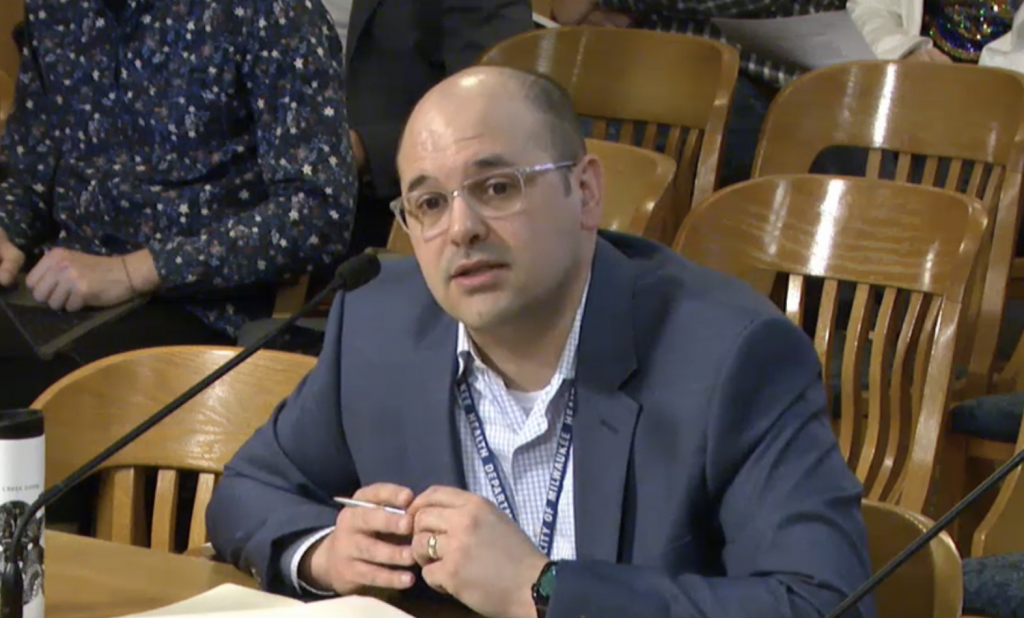New Health Commissioner Wins Key Approval
Michael Totoraitis says he's commited to providing long-term, strategic leadership.

Michael Totoraitis appears before the Public Safety & Health Committee. Image from City Channel – City Clerk’s Office.
Mr. T is taking over the Milwaukee Health Department.
On Thursday morning, Michael Totoraitis, Ph.D., secured the unanimous endorsement of the Public Safety & Health Committee to serve as the new commissioner. The full Common Council must still confirm his appointment.
Totoraitis currently serves as the director of health data and evaluation with the department.
“It puts me in a very unique role to move quickly into the commissioner role,” said Totoraitis of his current role. “I sought this position out, and I’m extremely committed to this city.”
He hopes to be a force of long-term stability for the department, which has now had six commissioners in six years. “We’ve had high turnover, and that’s been extremely disruptive to our department,” said Totoraitis.
The nominee intends to keep the current leadership team in place, including acting commissioner Tyler Weber returning to his role as deputy commissioner of environmental health. After more than a decade of seeming stability, the revolving door of commissioners started spinning in January 2018 when then-mayor Tom Barrett ousted longtime commissioner Bevan K. Baker for failures with the childhood lead poisoning prevention program.
Totoraitis would replace Kirsten Johnson, who announced her resignation in January after nearly two years on the job. Johnson was later appointed Secretary of the Wisconsin Department of Health Services.
He said the culture of the department reset under Johnson’s leadership. “We have a lot of progress to make, but I’m confident with the strategic plan we have in place that we will be in a much better position five years from now,” said Totoraitis.
Council members Marina Dimitrijevic and Khalif Rainey asked about what the city could be doing better about preventing lead poisoning and gun violence.
“We have gone through many health commissioners and still have a lot of work to do,” said Dimitrijevic.
She said the city’s current practice of intervening in lead poisoning only after a child has tested for positive for elevated blood lead levels is “really morally incorrect.” She cited the racial disparities prevalent in many Milwaukee health issues as a reason for change. Referencing the allocation of millions of dollars of American Rescue Plan Act funding, she said she wanted to move to a prevention-focused model.
“I think many of us realize that is a real opportunity to shift the needle,” said Totoraitis of the influx of federal funds. He said it would expand the workforce capable of doing abatement work and allow the department to do more work. He pledged to strategically allocate resources to areas of the city that have historically seen the highest lead poisoning rates.
Totoraitis also said a forthcoming report would show how lead paint dust, not lead water laterals, are the primary source of lead poisoning in the city.
The nominee also said he supports the department’s Office of Violence Prevention, now led by Ashanti Hamilton. “This is an issue that is important to me. Most of my career has been spent in violence prevention,” he said.
But Rainey pushed him on what could be done beyond the existing efforts. Totoraitis said the newly-installed Hamilton was working to improve things, but also additional data would help. Health department epidemiologists are expected to provide detailed data on violence hot spots and conditions to aid OVP’s efforts.
Totoraitis said he’s also focused on finishing a long-planned project that would create a public-facing dashboard of key department metrics. He said the turnover has made it difficult to complete the project.
But what is his top priority, given the numerous public health issues?
“I think it’s critical we prioritize a lot of these issues at the same time,” said Totoraitis. He said his role as commissioner would be to deliver resources to those doing the work and coordinate efforts.
Mayor Cavalier Johnson nominated Totoraitis for the role earlier this month after what his office said was a national search.
Totoraitis holds a Ph.D. in public and community health from the Medical College of Wisconsin.
He has been with the department since September 2021. Before earning his Ph.D. in 2021, Totoraitis was a program supervisor with Safe & Sound, a violence prevention research coordinator with the health department’s Milwaukee Homicide Review Commission and a grants analyst with Milwaukee County. He holds a bachelor’s degree in criminology and law studies from Marquette University.
Kirsten Johnson was the city’s fifth health commissioner in three years. Johnson replaced interim commissioner Marlaina Jackson, who served in the role from September 2020 to early 2021. Jeanette Kowalik served as commissioner for two years before resigning to take a health policy job in Washington D.C. She is now a health policy consultant. Patricia McManus served as a Common Council-appointed interim commissioner following Baker’s ouster.
The full council is expected to vote on the appointment at its May 9 meeting.
If you think stories like this are important, become a member of Urban Milwaukee and help support real, independent journalism. Plus you get some cool added benefits.
Political Contributions Tracker
Displaying political contributions between people mentioned in this story. Learn more.
- March 30, 2016 - Tom Barrett received $100 from Bevan K. Baker
- August 29, 2015 - Tom Barrett received $25 from Bevan K. Baker
City Hall
-
Council Blocked In Fight To Oversee Top City Officials
 Dec 16th, 2025 by Jeramey Jannene
Dec 16th, 2025 by Jeramey Jannene
-
Latest Effort to Adopt New Milwaukee Flag Going Nowhere
 Dec 3rd, 2025 by Jeramey Jannene
Dec 3rd, 2025 by Jeramey Jannene
-
After Deadly May Fire, Milwaukee Adds New Safety Requirements
 Dec 2nd, 2025 by Jeramey Jannene
Dec 2nd, 2025 by Jeramey Jannene





















